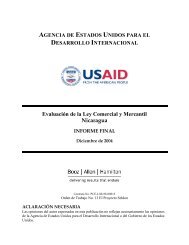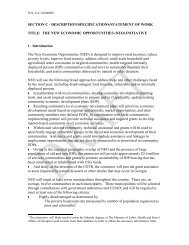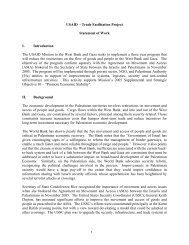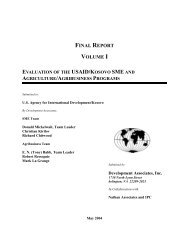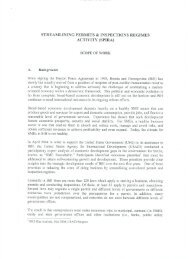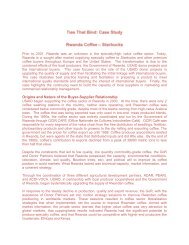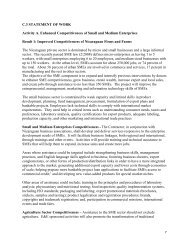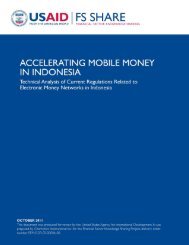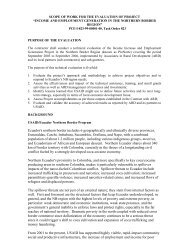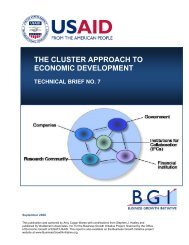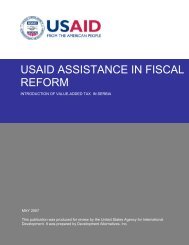TRADE AND COMMERCIAL LAW ASSESSMENT DECEMBER 2004HONDURASIV.CONTRACTSA. INTRODUCTIONAlthough it is not difficult to enter into contracts in <strong>Honduras</strong>, problems lie in the absence oflegal provisions for novel contract types <strong>and</strong> in inadequate supporting institutions.Modern contracts, such as leasing, franchising, factoring, <strong>and</strong> electronic contracts, are notaddressed by the current legal framework for contracts. Distribution agreements are unfavorablyregulated on behalf of local distributors. Powers of attorney granted in a foreign country,including other Central American countries, are not valid unless they pass through a complicatedprocess of legalizations <strong>and</strong> permits.Contract enforcement is complicated, slow, <strong>and</strong> expensive. The judicial system is ill prepared todeal with international business. Although the Supreme Court was recently appointed through atransparent mechanism, public concerns remain that reforms may meet resistance. Alternativedispute resolution mechanisms for contract enforcement are neither widely present nor widelyutilized.<strong>Law</strong>yers, in general, are not well trained in international business principles.B. LEGAL FRAMEWORKThe Civil Code provides the main legal principles for contracting. This code allows parties toform contracts on anything, provided it is not expressly prohibited or contrary to public order orcustom. 24 If the parties to the contract are companies or businesspeople, or the contract pertainsto commercial matters, the <strong>Commercial</strong> Code applies accessorily to the Civil Code.To form agreements that are not explicitly covered by law, such as leasing, franchising,factoring, <strong>and</strong> electronic contracts, parties devise custom-made contracts. Without explicit law,the potential for enforcement of such customized contracts is dubious. Electronic commercialtransactions are at risk of not being recognized because there is no legal certainty as to when anelectronic contract has formed, <strong>and</strong> about the legality of electronic signatures. There is fear thatfraud could be committed electronically in the course of commercial transactions given theabsence of legal protection.There are references to leasing in the <strong>Law</strong> on Financial Institutions <strong>and</strong> the <strong>Law</strong> on Sales Tax;however, there is no comprehensive law governing these contracts. There is a <strong>Law</strong> on Sell byInstallment without Transferring Title through which a person can buy a movable asset such as acar by paying in installments. In these cases, property can be used during payment, but title is nottransferred until the entire price is paid. Such contracts differ from leasing contracts because, inthe latter, there is no commitment to transfer property. If an asset is returned in a Sell byInstallment without Transferring Title, the buyer can receive a portion or sometimes thecomplete payment.24 CdCom. Art. 1564.IV-1
TRADE AND COMMERCIAL LAW ASSESSMENT DECEMBER 2004HONDURASAlthough the system is formalistic in many regards, parties are free to assign any name to acontract. A contracting party will sometimes disguise a contract by assigning a name that wouldenhance that party’s rights, but courts are supposed to look at the nature of the agreement ratherthan its assigned name to determine the contract’s effect. For example, it is common forl<strong>and</strong>lords to disguise rental agreements as not-for-payment loans supplemented with letters ofcredit to facilitate eviction of a tenant. Such contracts should not be honored by a court if it isproved that the nature of the contract is that of a rental agreement.Distribution <strong>and</strong> representation contracts are subject to a special law passed in the 1970s, whichis disproportionately protective of the interests of local distributors. 25 To validate such a contract,parties must register the contract at the Industry <strong>and</strong> <strong>Trade</strong> Ministry. If the contract is terminatedby the foreign company, the local distributor is entitled to compensation equal to the averageannual net income it has received over the last 5 years of the contract’s life. In addition, in casesof unilateral cancellation, the local distributor can obtain an injunction to prohibit furtherdistribution of the products it was distributing before the contract was terminated. Similarly,distribution contracts are not subject to foreign jurisdiction <strong>and</strong> cannot be governed by foreignentities. As a result of these conditions of distribution <strong>and</strong> representative contracts, many foreigncompanies are reluctant to introduce their products in the Honduran market.In general, contracts do not require notarization. But certain kinds of contracts, such as sale ofreal property <strong>and</strong> mortgages, do require authentication. Entering into oral contracts is nominallypossible for amounts of less than $10. Such a low threshold serves to make the allowance of oralcontracts irrelevant.Powers of attorney are required whenever someone is authorized to undertake an activity onbehalf of another party. In <strong>Honduras</strong>, powers of attorney must be authenticated by a publicnotary. Because <strong>Honduras</strong> is not a signatory of the Inter-American Convention on the LegalRegime of Powers of Attorney Abroad, a power of attorney granted in a foreign country, even aCentral American country, must be legalized by the Honduran consulate in the foreign country<strong>and</strong> then authorized by the Ministry of Foreign Affairs. The process of authenticating foreignpowers of attorney is long, tedious, <strong>and</strong> expensive <strong>and</strong> tends to discourage their use. If a powerof attorney is to be used abroad the authentication process is even more tedious. First, thestatement of power of attorney between parties must be notarized. It then must be taken to theSupreme Court for approval <strong>and</strong> notarized by a notary recognized in <strong>Honduras</strong>. Next, thedocument must be taken to the Ministro de Gobernación to verify the authorization of theSupreme Court. The document must then be ratified by the Ministry of Foreign Affairs. Finally,the power of attorney is taken to the consulate of the foreign country for approval.The <strong>Law</strong> on Government Contracts governs contracts with the government for sale or purchaseof goods <strong>and</strong> services. Under the terms of this law, government contracts are subject to specialrequirements, such as a public bidding process. In some cases, the bidding process has beenperceived by interviewees to be corrupt. Suits can be filed against an allegedly unfair bid, but therisk of being blacklisted because of such actions is so high that no suit has ever been brought25 See the <strong>Law</strong> of Agents, Distributors, <strong>and</strong> Representatives of National <strong>and</strong> Foreign Enterprise, Ley deRepresentantes, Distribuidores y Agentes de Empresas Nacionales y Extranjeras.IV-2




